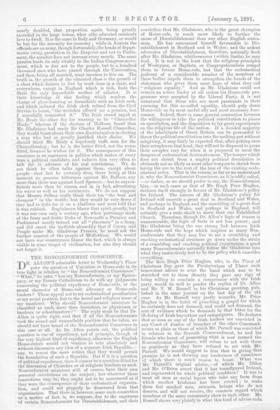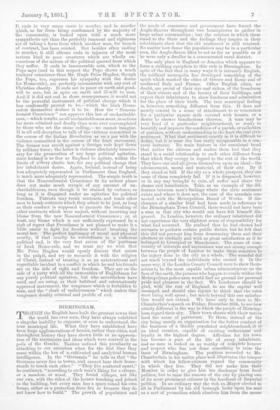THE NONCONFORMIST CONSCIENCE. D R. ALLON'S admirable letter to Wednesday's Times
puts the question of Unionism or Home-rule in its true light in relation to "the Nonconformist Conscience." "What," he asks, "has my Nonconformity, or my Episco- pacy, or my Roman Catholicism to do with my judgments concerning the political expediency of Home-rule, or the moral character of Home-rule advocacy or Home-rule leaders ? These appeal not to my ecclesiastical peculiarities .or my social position, but to the moral and religious sense of my manhood. Why should Nonconformist ministers be classified as such, more than barristers, or physicians, or bankers, or schoolmasters ? " The reply must be that Dr. Allen is quite right, and that if all the Nonconformists took the sound and unassailable position that he takes, we should not have heard of the Nonconformist Conscience in this case at all. As Dr. Allen points out, the political question is one of expediency, not of principle, though of the very highest kind of expediency, otherwise the English Home-rulers would not venture to veto absolutely and without discussion any idea of a separate Irish Republic,— 'nay, to resent the mere notion that they would permit the foundation of such a Republic. But if it is a question of political expediency, then it cannot be a question fitted for the discussion of Churches or of religious teachers as such. Nonconformist ministers will, of course, have their own personal convictions on the subject; but whatever these convictions may be, they ought not to be announced as if they were the consequence of their ecclesiastical organisa- tion, and could not properly be dissevered from that organisation. That there is, however, some such connection as a matter of fact, is, we suppose, clue to the eagerness 'of certain Nonconformists for Disestablishment, and their conviction that Mr. Gladstone, who is the great champion of Home-rule, is much more likely to further the cause of Disestablishment than any other English states- man. He has - announced himself favourable to Dis- establishment in Scotland and in Wales ; and the ardent advocates of Disestablishment, therefore, naturally flock after Mr. Gladstone, whithersoever (within limits) he may lead. It is not in the least that the religious principles of Wesleyans, or Baptists, or Congregationalists compel them to favour Home-rule, but that the ecclesiastical jealousy of a considerable number of the members of these bodies impels them to strengthen the hands of the statesman who gives them most hope of what they call "religious equality." And as Mr. Gladstone could not remain an active leader at all unless his Home-rule pro- gramme were accepted by the Liberal Party, it is not' unnatural that those who are most passionate in their yearning for this so-called equality, should gulp down Home-rule as its most useful ally and most necessary fore- runner. Indeed, there is some general connection between the willingness to take the political constitution to pieces on speculation, and the disposition to try great experiments on the religious life of the nation. If a decided majority of the inhabitants of Great Britain can be persuaded to throw the political constitution into the melting-pot without misgiving, it may fairly be expected that, after getting over their scruples on that head, they will not be disposed to press their scruples very far when it is proposed to incur the dangers of ecclesiastical destructiveness. The temper which does not shrink from a mighty political denudation is obviously not so likely as most other tempers to shrink from laying the axe to the root of the tree of the existing eccle- siastical order. That is the reason, so far as we understand it, why the Nonconformist Conscience, as it is oddly called, —or rather, as we should prefer to say, the Nonconformist bias,—in such cases as that of Mr. Hugh Price Hughes, declares itself strongly in favour of Mr. Gladstone's policy for Ireland. The success of Mr. Gladstone's policy for Ireland will unsettle a great deal in Scotland and Wales, and perhaps in England, and the unsettling of a great deal in Scotland and Wales, and perhaps in England, will certainly give a rude shock to more than one Established Church. Therefore, though Dr. Allen's logic of reason is unanswerable, the logic of facts is not less potent ; and Mr. Gladstone being the one strong link between Irish Home-rule and the hope which inspires so many Non- conformists that they may live to see a crumbling and cracking ecclesiastical structure go down under the strain of a crumbling and cracking political constitution, a good many Nonconformists naturally follow Mr. Gladstone into what they instinctively feel to be the policy which unsettles everything. The Rev, Hugh Price Hughes, who, in the Times of Christmas Day gave the Presbyterians of Ulster such benevolent advice to seize the hand -which was to be stretched out to them directly they gave any sign of being willing to conclude a compromise with the Irish party, would do well to ponder the replies of Dr. Allen and Mr. T. W. Russell to his Christmas greeting, pub- lished in the same journal on the last day of the old year. As Mr. Russell very justly remarks, Mr. Price Hughes is in the habit of preaching a gospel for which he certainly does not demand, and could not demand, the sort of evidence which he demands in that letter for the ill-doing of Irish boycotters and campaigners. He declares that so soon as any of the Irish leaders are convicted in any Court of Justice of breaches of the other Command- ments as plain as those of which Mr. Parnell was convicted in relation to the Seventh Commandment, he and his friends who boast of possessing what is now termed the Nonconformist Conscience, will refuse to act with -them as positively as they have refused to act with Mr. Parnell. We would suggest to him that in giving that promise be is not showing any tenderness of conscience of which there is much reason to boast. What was Mr. Parnell's original advice,—of which Mr. Dillon and Mr. O'Brien assert that it has transfigured Ireland, and regenerated its whole political condition ? It was to treat all men as social lepers who take any farm from which another Irishman has been evicted ; to make them feel marked men, outcasts, beings who do not deserve, and will not receive, the common regard which members of the same community show to each other. Mr. Russell shows very plainly in what this kind of advice ends. It ends in very many cases in murder, and in murder 33aich, so far from being condemned by the majority of Ihe community, is looked upon with a much more sympathetic eye than the perfectly innocent and righteous act of taking a farm from which another man, for breach of contract, has been evicted. But besides often ending in murder, it still oftener ends in injuries of the most serious kind to poor creatures which are wholly un- conscious of the nature of the political quarrel from which they suffer. It ends in innumerable acts, which as the Pope says (and in this respect the Pope shows a much tenderer conscience-than Mr. Hugh Price Hughes, though the Pope, too, expresses his sympathy with the desire for Home-rule), are perfectly inconsistent with any sort of Christian charity. It ends not in peace on earth and good- will to men, but in spite on earth and to men. And if it did not end in these consequences, it would not be the powerful instrument of political change which it has confessedly proved to her—which the Irish Home- rulers themselves declare it to be. How the "Noncon- formist Conscience" can approve this law of uncharitable- nes s,—which results, as all uncharitableness must, in actions far more criminal and deadly than were ever contemplated by those who set the atone rolling,—we cannot imagine. It is all self-deception to talk of the violence committed in the course of the Italian Revolution as on a par with the violence committed in the course of the Irish movement. The former was revolt against a foreign rule kept down by military force ; the latter is violence absolutely unneces- sary for the prosecution of any large political agitation, since Ireland is as free as England to agitate, within the limits of a'Arery elastic law,- for any political change that her inhabitants desire. Again, Ireland, instead of being less adequately represented in Parliament than England, is much more adequately represented. The simple truth is that the Nonconformist Conscience in its newest phase does not make much scruple of any amount of un- charitableness, even though it be stained by violence, so long as it is disguised under an agitation for political freedom. Patriots may break contracts, and teach other men to break contracts which they admit to be just, so long as their conduct is supposed to promote the breaking of , other contracts which were unjust, without incurring any blame froip the new Nonconformist Conscience ; or, at least, any blame which is not sufficiently expressed by a sigh of regret that Providence is not pleased to make it a little easier to fight for freedom without breaking the moral law. The perfect legitimacy of moral and physical cruelty, if that cruelty be subordinate to a sufficient political end, is the very first axiom of the partisans of Irish Home-rule, and we must say we wish that Mr. Price Hughes would openly discuss that axiom in the pulpit, and try to reconcile it with the religion of Christ, instead of treating it as an unintentional and regrettable incident in a conflict in which he and his friends are on the side of right and freedom. They are on the side of a party with all the immunities of Englishmen for any purely political agitation, but who nevertheless have used, and are using, as their habitual and ostentatiously approved instrument, the vengeance which is forbidden to man, and the "cloak of maliciousness" which moles that vengeance doubly criminal and prolific of evil.















































 Previous page
Previous page